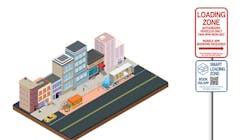Four U.S. cities selected for Digital Curb Challenge
Four U.S. cities have been selected for the 2020 Digital Curb Challenge, a program launched by curb management company Coord in January. Aspen, Colo., Nashville, Tenn., Omaha, Neb., and West Palm Beach, Fla., will work with the company to establish Smart Zone programs.
According to Coord, these Smart Zone programs will be tailored to each city’s “unique mobility challenges, with the goals of reducing congestion, improving safety and supporting local economic activity.” The company cites growing delivery, ride-hail and shared micromobility activity, along with increased promotion of sustainable transit like buses and bikes and the need for more dedicated space for recreation and commercial activity as factors influencing a change in what is required in municipal curb management.
Smart Zones will be areas where commercial drivers use their mobile devices to locate, hold, book and pay for time in available loading zones. Coord says this not only allows for better curb management but improves the loading experience for delivery companies and businesses. The pilot cities will gain information about when, where and how long drivers are loading and can then use the data to adjust space where it is needed and when it is needed.
“We were delighted at the outpouring of interest in the Digital Curb Challenge from across the U.S. and Canada,” said Stephen Smyth, co-founder and CEO of Coord. “We look forward to working closely with Aspen, Nashville, Omaha and West Palm Beach to develop and launch Smart Zone pilot programs that address critical mobility challenges in these cities and to demonstrate the power of the curb in creating significant, tangible impacts in their communities and local economies.”
In addition to the four pilot cities, nine cohort cities were also selected. This includes Vancouver, BC, Baltimore, Md., Sarasota, Fla., Bend, Ore., Norwalk, Conn., Fort Smith, Ark., Halifax, NS, Portland, Maine, and Walnut Creek, Calif. Coord explains the cohort cities will have a front row seat to the work that pilot cities are doing as part of the Digital Curb Challenge and will form a community for city leaders and staff to share best practices, learnings and resources across curb management.
The Pilot Cities
Aspen will use the pilot program to help streamline commercial deliveries serving the city’s restaurants, retailers and other businesses. Mitch Osur, director of parking at the city of Aspen, says the partnership will make it possible for the city to discover more granular detail of how its loading zones are utilized.
“Our goal ultimately is to provide a more seamless, organized and coordinated delivery experience for both our commercial vendors and our business owners,” said Osur.
Nashville will undertake this pilot to better coordinate access to its curb space as an initial step toward rationalizing policies for commercial users of the curb in order to support broader city goals around safety and sustainability.
“With Nashville’s growth, the demands put on our extremely-limited curb space downtown have increased dramatically—from rideshare and transpotainment, to delivery services for freight, online shopping and take-out dining,” said Faye DiMassimo, Nashville Mayor John Cooper’s senior advisor for Transportation and Infrastructure. “By partnering with Coord to pilot Smart Zones downtown, we hope to increase compliance with loading regulations, improve traffic flow and safety, accommodate rising curb-access needs, collect quality data and ultimately capture the true cost of Metro-provided services to reframe and re-value private use of public space.”
Metropolitan Omaha is undertaking this pilot program to better coordinate access to its curb space for vehicles performing commercial loading to reduce congestion and safety hazards caused by double-parking.
"We are excited to participate in the 2020 Digital Curb Challenge with Coord. This will support our organizational goals to provide a positive experience for downtown visitors by actively managing our curb space,” said Ken Smith, Parking and Mobility manager at the city of Omaha.
West Palm Beach, a waterfront city, is undertaking this pilot program to better coordinate access to its curb space for vehicles performing pickups and deliveries to reduce congestion and safety hazards in the Rosemary Square area.
“West Palm Beach is committed to utilizing the latest in technology and data to drive transportation policies that improve the overall quality of life of residents and visitors in our city,” said West Palm Beach Mayor Keith A. James.
About the Author

Mischa Wanek-Libman
Group Editorial Director
Mischa Wanek-Libman is director of communications with Transdev North America. She has more than 20 years of experience working in the transportation industry covering construction projects, engineering challenges, transit and rail operations and best practices.
Wanek-Libman has held top editorial positions at freight rail and public transportation business-to-business publications including as editor-in-chief and editorial director of Mass Transit from 2018-2024. She has been recognized for editorial excellence through her individual work, as well as for collaborative content.
She is an active member of the American Public Transportation Association's Marketing and Communications Committee and served 14 years as a Board Observer on the National Railroad Construction and Maintenance Association (NRC) Board of Directors.
She is a graduate of Drake University in Des Moines, Iowa, where she earned a Bachelor of Arts degree in Journalism and Mass Communication.
